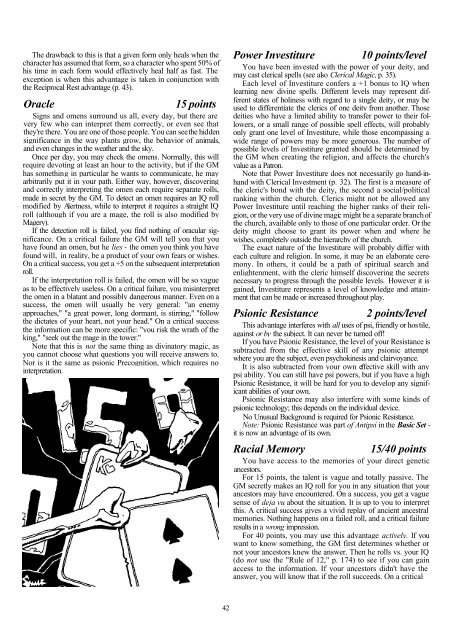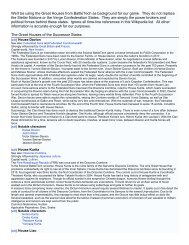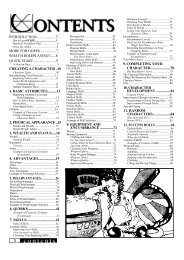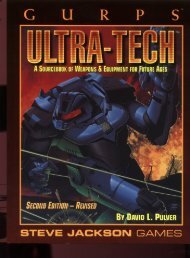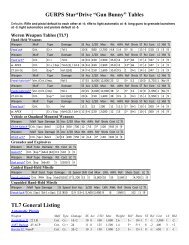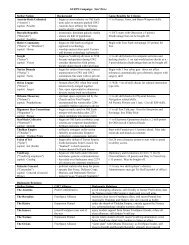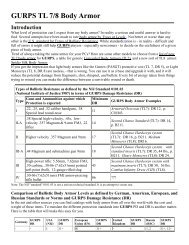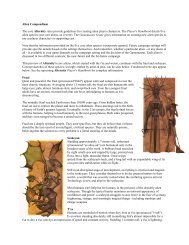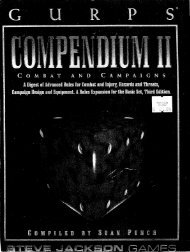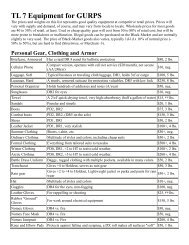GURPS - Compendium 1..
GURPS - Compendium 1..
GURPS - Compendium 1..
You also want an ePaper? Increase the reach of your titles
YUMPU automatically turns print PDFs into web optimized ePapers that Google loves.
The drawback to this is that a given form only heals when the<br />
character has assumed that form, so a character who spent 50% of<br />
his time in each form would effectively heal half as fast. The<br />
exception is when this advantage is taken in conjunction with<br />
the Reciprocal Rest advantage (p. 43).<br />
Oracle<br />
15 points<br />
Signs and omens surround us all, every day, but there are<br />
very few who can interpret them correctly, or even see that<br />
they're there. You are one of those people. You can see the hidden<br />
significance in the way plants grow, the behavior of animals,<br />
and even changes in the weather and the sky.<br />
Once per day, you may check the omens. Normally, this will<br />
require devoting at least an hour to the activity, but if the GM<br />
has something in particular he wants to communicate, he may<br />
arbitrarily put it in your path. Either way, however, discovering<br />
and correctly interpreting the omen each require separate rolls,<br />
made in secret by the GM. To detect an omen requires an IQ roll<br />
modified by Alertness, while to interpret it requires a straight IQ<br />
roll (although if you are a mage, the roll is also modified by<br />
Magery).<br />
If the detection roll is failed, you find nothing of oracular significance.<br />
On a critical failure the GM will tell you that you<br />
have found an omen, but he lies - the omen you think you have<br />
found will, in reality, be a product of your own fears or wishes.<br />
On a critical success, you get a +5 on the subsequent interpretation<br />
roll.<br />
If the interpretation roll is failed, the omen will be so vague<br />
as to be effectively useless. On a critical failure, you misinterpret<br />
the omen in a blatant and possibly dangerous manner. Even on a<br />
success, the omen will usually be very general: "an enemy<br />
approaches," "a great power, long dormant, is stirring," "follow<br />
the dictates of your heart, not your head." On a critical success<br />
the information can be more specific: "you risk the wrath of the<br />
king," "seek out the mage in the tower."<br />
Note that this is not the same thing as divinatory magic, as<br />
you cannot choose what questions you will receive answers to.<br />
Nor is it the same as psionic Precognition, which requires no<br />
interpretation.<br />
Power Investiture<br />
10 points/level<br />
You have been invested with the power of your deity, and<br />
may cast clerical spells (see also Clerical Magic, p. 35).<br />
Each level of Investiture confers a +1 bonus to IQ when<br />
learning new divine spells. Different levels may represent different<br />
states of holiness with regard to a single deity, or may be<br />
used to differentiate the clerics of one deity from another. Those<br />
deities who have a limited ability to transfer power to their followers,<br />
or a small range of possible spell effects, will probably<br />
only grant one level of Investiture, while those encompassing a<br />
wide range of powers may be more generous. The number of<br />
possible levels of Investiture granted should be determined by<br />
the GM when creating the religion, and affects the church's<br />
value as a Patron.<br />
Note that Power Investiture does not necessarily go hand-inhand<br />
with Clerical Investment (p. 32). The first is a measure of<br />
the cleric's bond with the deity, the second a social/political<br />
ranking within the church. Clerics might not be allowed any<br />
Power Investiture until reaching the higher ranks of their religion,<br />
or the very use of divine magic might be a separate branch of<br />
the church, available only to those of one particular order. Or the<br />
deity might choose to grant its power when and where he<br />
wishes, completely outside the hierarchy of the church.<br />
The exact nature of the Investiture will probably differ with<br />
each culture and religion. In some, it may be an elaborate ceremony.<br />
In others, it could be a path of spiritual search and<br />
enlightenment, with the cleric himself discovering the secrets<br />
necessary to progress through the possible levels. However it is<br />
gained, Investiture represents a level of knowledge and attainment<br />
that can be made or increased throughout play.<br />
Psionic Resistance<br />
2 points/level<br />
This advantage interferes with all uses of psi, friendly or hostile,<br />
against or by the subject. It can never be turned off!<br />
If you have Psionic Resistance, the level of your Resistance is<br />
subtracted from the effective skill of any psionic attempt<br />
where you are the subject, even psychokinesis and clairvoyance.<br />
It is also subtracted from your own effective skill with any<br />
psi ability. You can still have psi powers, but if you have a high<br />
Psionic Resistance, it will be hard for you to develop any significant<br />
abilities of your own.<br />
Psionic Resistance may also interfere with some kinds of<br />
psionic technology; this depends on the individual device.<br />
No Unusual Background is required for Psionic Resistance.<br />
Note: Psionic Resistance was part of Antipsi in the Basic Set -<br />
it is now an advantage of its own.<br />
Racial Memory<br />
15/40 points<br />
You have access to the memories of your direct genetic<br />
ancestors.<br />
For 15 points, the talent is vague and totally passive. The<br />
GM secretly makes an IQ roll for you in any situation that your<br />
ancestors may have encountered. On a success, you get a vague<br />
sense of deja vu about the situation. It is up to you to interpret<br />
this. A critical success gives a vivid replay of ancient ancestral<br />
memories. Nothing happens on a failed roll, and a critical failure<br />
results in a wrong impression.<br />
For 40 points, you may use this advantage actively. If you<br />
want to know something, the GM first determines whether or<br />
not your ancestors knew the answer. Then he rolls vs. your IQ<br />
(do not use the "Rule of 12," p. 174) to see if you can gain<br />
access to the information. If your ancestors didn't have the<br />
answer, you will know that if the roll succeeds. On a critical<br />
42


